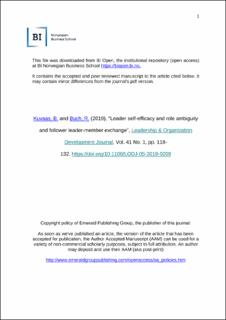Leader self-efficacy and role ambiguity and follower leader-member exchange
Journal article, Peer reviewed
Accepted version
Permanent lenke
https://hdl.handle.net/11250/2660943Utgivelsesdato
2019Metadata
Vis full innførselSamlinger
- Publikasjoner fra CRIStin - BI [1015]
- Scientific articles [2181]
Originalversjon
Leadership & Organization Development Journal. 2019, 41 (1), 118-132. 10.1108/LODJ-05-2019-0209Sammendrag
Purpose
The purpose of this paper is to investigate whether leader self-efficacy and leader role ambiguity are related to follower leader-member exchange (LMX). In addition, the authors examine whether the relationship between follower LMX and turnover intention will be mediated by need satisfaction.
Design/methodology/approach
Data were collected using an electronic survey tool filled out by 109 leaders and 696 followers.
Findings
Leader role ambiguity was positively related to an economic LMX relationship and negatively related to a social LMX relationship. Furthermore, the links between social and economic LMX relationships and turnover intention were mediated by satisfaction of the needs for autonomy and relatedness.
Research limitations/implications
The main limitation of the study is the cross-sectional nature of the data from the followers.
Practical implications
Provided that the findings are generalizable organizations should provide role clarification initiatives to leaders with high role ambiguity.
Originality/value
Despite the centrality of role theory in the development of LMX theory, prior research has not investigated whether the extent to which leaders perceive that they meet the expectations of their leadership roles affects followers’ perception of LMX relationships.
